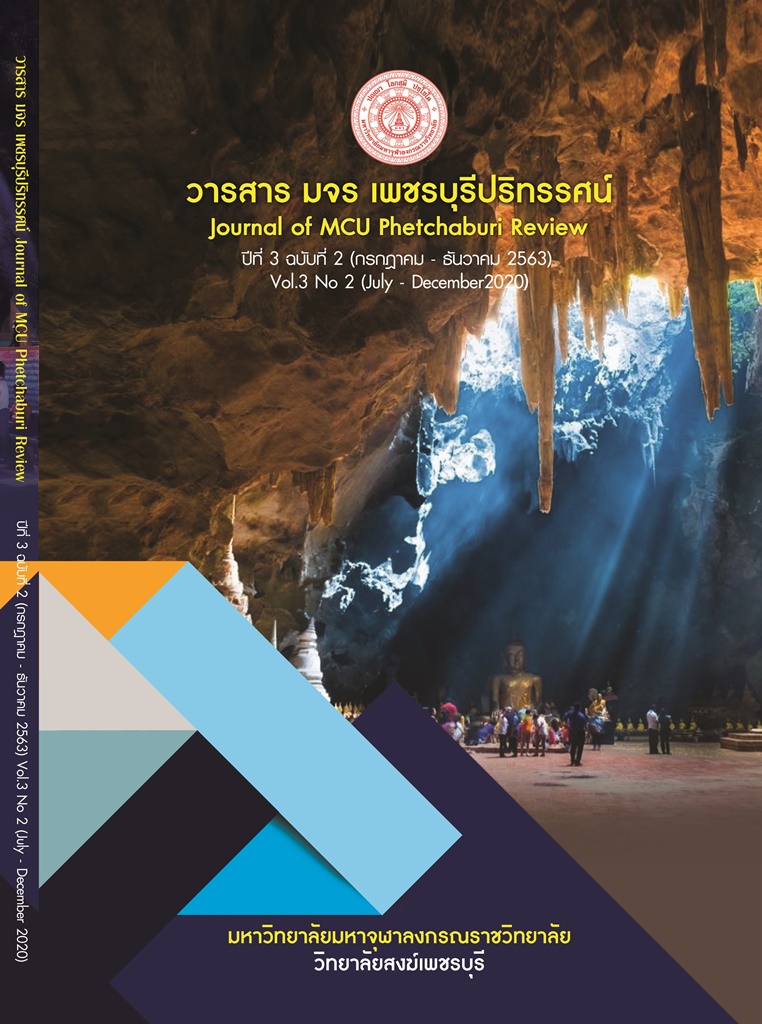POLITICAL POWER ON BUDGET ALLOCATION FOR ECONOMICS AND SOCIALDEVELOPMENT IN THAILAND
Main Article Content
Abstract
This article aims to study the relationship between Political power and economic and social development The budget of the country is allocated as a tool to achieve the goals set by the political power of the people in the economic and social development policy. This is the foundation of the country's development to a completely democratic country. Through economic and social development in line with democratic approaches that emphasize decentralization of power and resources Giving people access to the resources and welfare that the State should allocate the state had to modify the concept. And is committed to solving the problem of inequality between the rich and the poor. Problems of ineffective use of budget; problem solving of economic downturn; Central government system and developing competitiveness. The Political power budget allocation and economic and social development They are closely related to each other that they are difficult to separate. Influence groups include military groups, civil servant groups, Politicians, business groups, academic groups, and public groups. Plays an essential role in determining the annual expenditure budget. Depending on the ideology of the political leaders or the influential group at that time, Budget allocation to one's own and his group in a higher proportion than the influence groups who play a role or do not play a role in the country's governance. However, a country known as a democracy can be fully democratic only if the economic system is fair in allocating returns from financial operations. There is fairness in policymaking. And have economic measures and appropriate budget allocation in line with democratic principles that emphasize the universal distribution of power and resources. and by the situation occurring within the country with the interests of the people as important
Article Details
References
คริส เบเคอร์ และผาสุก พงษ์ไพจิตร. (2564). ประวัติศาสตร์ไทยร่วมสมัย. กรุงเทพมหานคร: มติชน.
จรูญ สุภาพ. (2514). การเมือง. กรุงเทพมหานคร: ไทยวัฒนาพานิช.
ไชยรัตน์ เจริญสินโอฬาร. (2557). รัฐศาสตร์แนววิพากษ์. กรุงเทพมหานคร: สำนักพิมพ์มหาวิทยาลัยธรรมศาสตร์.
ธนพันธ์ ไล่ประกอบทรัพย์. (2559). เศรษฐกิจ การเมือง โครงสร้างของรัฐ และการพัฒนานโยบายสาธารณะ ในมุมมองเปรียบเทียบ. กรุงเทพมหานคร: โรงพิมพ์แห่งจุฬาลงกรณ์มหาวิทยาลัย.
ธนาธร จึงรุ่งเรืองกิจ. (2563). เสวนาวิชาการ อนาคตงบประมาณไทย อนาคตใหม่ประชาชน. เรียกใช้เมื่อ 20 ตุลาคม 2563 จาก Youtube.com/watch?v=Wq-YbVOTCuA
บวรศักดิ์ อุวรรณโณ. (2543). ความสัมพันธ์ระหว่างประชาธิปไตย ธรรมาภิบาล และการพัฒนาเศรษฐกิจและสังม. กรุงเทพมหานคร: จดหมายข่าวสถาบันพระปกเกล้า.
ประจักษ์ ก้องกีรติ. (2561). ระบอบประยุทธ์. วารสาร ฟ้าเดียวกัน, 16(2),7-42.
พรศักดิ์ ผ่องแผ้ว. (2542). การศึกษารัฐศาสตร์แนวทางอำนาจ. ใน เอกสารการสอน ชุดหลักวิชาหลักและวิธีการศึกษาทางรัฐศาสตร์. มหาวิทยาลัยสุโขทัยธรรมาธิราช.
พรอัมรินทร์ พรหมเกิด. (2556). สังคมวิทยาการเมือง. ขอนแก่น: โรงพิมพ์มหาวิทยาลัยขอนแก่น.
พระมหาหรรษา ธมฺมหาโส. (2557). พระพุทธศาสนากับวิทยาการสมัยใหม่. พระนครศรีอยุธยา: โรงพิมพ์มหาวิทยาลัยมหาจุฬาลงกรณราชวิทยาลัย.
วนิดา สัจพันโรจน์. (2550). เศรษฐศาสตร์การเมืองว่าด้วยการจัดสรรงบประมาณแผ่นดินของไทย ระหว่าง ปี พ.ศ.2504 – 2549. ใน วิทยานิพนธ์ศิลปศาสตรมหาบัณฑิต สาขาวิชาเศรษฐศาสตร์การเมือง. จุฬาลงกรณ์มหาวิทยาลัย.
ศุภพิชญ์ มวลตะคุ. (2563). เปรียบเทียบการจัดสรรงบประมาณรายจ่ายระหว่างก่อนและหลังการรัฐประหาร ปี พ.ศ.2557. วารสารชุมชนวิจัย มหาวิทยาลัยราชภัฏนครราชสีมา, 14(1),205-218.
สมบัติ ธํารงธัญวงศ์. (2554). การเมือง :แนวความคิดและการพัฒนา. กรุงเทพมหานคร: สํานักพิมพ์เสมาธรรม.
องค์กรยูนิเซฟ ประเทศไทย. (2563). การประเมินผลกระทบรวมด้านเศรษฐกิจและสังคมจากการแพร่ระบาดของ โควิด – 19 ในประเทศไทย. กรุงเทพมหานคร: สำนักงานผู้ประสานงานสหประชาชาติประจำเทศไทย.
Ahn Chung Si. (1997). Economic dimension of democratization in South Korea. Singapore: Institute of Southeast Asian Studies.
BBC News. (2017). Government spokesman confirmed Cabinet approved submarine purchase. เรียกใช้เมื่อ 24 April 2017 จาก https://www.bbc.com /thai/thailand-39694976
Billion Mindset Team. (2561). 4 แนวคิดพัฒนา “เกาหลีใต้” จากประเทศที่คนมีรายได้เท่าไทย จนตอนนี้ดีกว่า 5 เท่า. เรียกใช้เมื่อ 1 กันยายน 2561 จาก https://www. billionway.co/south-korea-from-agriculture-to-future
Carol A.B.Warren. (1970). Sociology : Change and Community. Illinois: The Dorsey Press.
Easton David. (1979). A System Analysis Of Political Life. Chicago: University Of Chicago Press.
Ernest Barker. (1945). The Politics of Aristotle. Oxford: Oxford University Press.
Haywood A. (2007). Politics. New York: Pal Grave.
Insulza Jose M. (1989). Building Democracy. Colorado: Lynne Riener Publisher.
Parliamentary Budget Ofiice. (2564). รายงานการวิเคราะห์งบประมาณรายจ่าย ประจำปีงบประมาณ พ.ศ. 2564. กรุงเทพมหานคร: สำนักงานเลขาธิการสภาผู้แทนราษฏร.
Poulantzas N. (1978). State, Power, Socialim. London: Verso Classics.
Przeworski, A. & Limongi, F. (1993). Political regimes and economic growth. Journal of Economic Perspectives, 7(3),60-72.
R.M. Maciver. (1949). The Web of Government. New York: Macmilan Company.
Sherman Arnold K. & Kolker A. (1997). The Social Bases of Politics. New York: Wadsworth.
Thairath Online News. (2016). Opening the budget for the rental of the 'Big Pom' team, flying over the sky to Hawaii with a budget of over 20 million. Retrieved October 2, 2016 From https://www.thairath.co.th/content /741276


